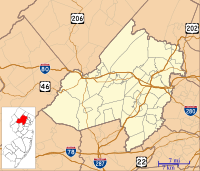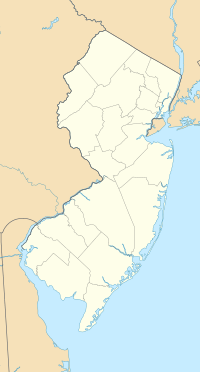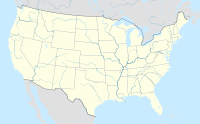Dover station (NJ Transit) facts for kids
Quick facts for kids
Dover
|
|||||||||||||||||||
|---|---|---|---|---|---|---|---|---|---|---|---|---|---|---|---|---|---|---|---|
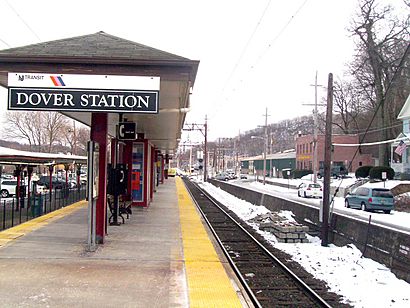
Dover station from the island platform in the center of the station.
|
|||||||||||||||||||
| Location | East Dickerson Street at South Bergen Street, Dover, Morris County, New Jersey 07801 |
||||||||||||||||||
| Owned by | NJ Transit | ||||||||||||||||||
| Platforms | 1 island platform | ||||||||||||||||||
| Tracks | 2 | ||||||||||||||||||
| Connections | |||||||||||||||||||
| Construction | |||||||||||||||||||
| Parking | Hourly and reserved | ||||||||||||||||||
| Disabled access | Yes | ||||||||||||||||||
| Other information | |||||||||||||||||||
| Station code | 38 (Delaware, Lackawanna and Western) | ||||||||||||||||||
| Fare zone | 17 | ||||||||||||||||||
| History | |||||||||||||||||||
| Opened | July 31, 1848 | ||||||||||||||||||
| Rebuilt | November 1, 1901 | ||||||||||||||||||
| Electrified | January 22, 1931 | ||||||||||||||||||
| Traffic | |||||||||||||||||||
| Passengers (2017) | 983 (average weekday) | ||||||||||||||||||
| Services | |||||||||||||||||||
|
|||||||||||||||||||
|
|||||||||||||||||||
|
Delaware, Lackawanna and Western Railroad Station (a.k.a. Dover Railroad Station)
|
|||||||||||||||||||
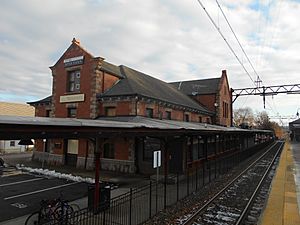
The station depot at Dover, seen in December 2014 with no business renting the depot.
|
|||||||||||||||||||
| Location | Dover, New Jersey, USA | ||||||||||||||||||
| Area | 0.6 acres (0.2 ha) | ||||||||||||||||||
| Built | 1902 | ||||||||||||||||||
| Architect | F.J. Nies | ||||||||||||||||||
| NRHP reference No. | 80002511 | ||||||||||||||||||
| Added to NRHP | May 23, 1980 | ||||||||||||||||||
The Dover train station is an important stop for NJ Transit trains in Dover, Morris County, New Jersey. It was first built in 1901 by the Delaware, Lackawanna and Western Railroad. This historic station was added to the National Register of Historic Places in 1980.
Contents
History of Dover Station
When Did Trains First Arrive in Dover?
The very first train arrived in Dover on July 31, 1848. It traveled on the Morris & Essex Railroad line. Later, in 1863, another company called the Delaware, Lackawanna & Western Railroad (DL&W) took over this line.
Building the New Station
The current station building opened on November 1, 1901. A special train called the Buffalo Express arrived at 3:00 p.m. to mark the opening. Local citizens and the Dover Cornet Band were there to celebrate. After the opening ceremony, everyone enjoyed a dinner at the Mansion House Hotel.
Station Layout and Train Services
Which Train Lines Use Dover Station?
The Dover station serves two main train lines: the Morristown Line and the Montclair-Boonton Line. These lines can take you to Hoboken or directly to New York City via Midtown Direct service. On weekends and holidays, trains usually do not go further west than Dover.
What Does the Station Look Like?
The station has a single platform in the middle, called an island platform. This means you can board trains from either side of the platform. There is also a ticket agent inside the station building who can help you seven days a week. East of the station, you'll find a large train yard where NJ Transit keeps its trains.
Why Do Some Trains End at Dover?
Many trains on the Morristown Line and some on the Montclair-Boonton Line finish their journey at Dover. This is because Dover is where the electric train tracks end. West of Dover, the tracks are not electrified. So, if you want to travel further west to places like Hackettstown, you'll need to take a diesel train.
| P Platform level |
Track 1 | ← Morristown Line and Montclair-Boonton Line limited service toward Hackettstown (Mount Arlington) ← Morristown Line and Montclair-Boonton Line termination track |
| Island platform, doors will open on the left | ||
| Track 2 | Morristown Line and Montclair-Boonton Line toward Hoboken or New York (Denville) → | |
| G | Street level | Station building, ticket machines, parking |
 | Kyle Baker |
 | Joseph Yoakum |
 | Laura Wheeler Waring |
 | Henry Ossawa Tanner |


